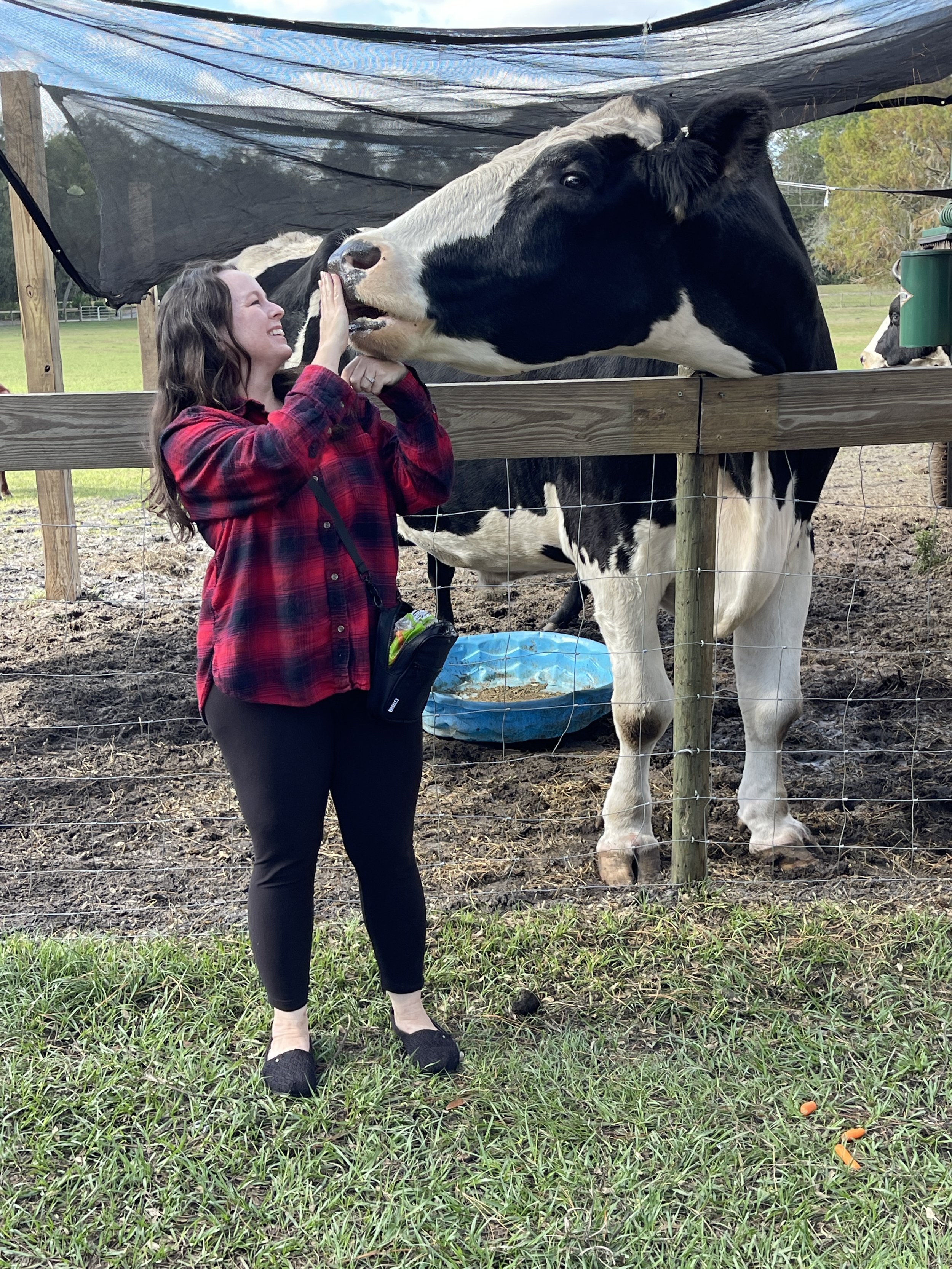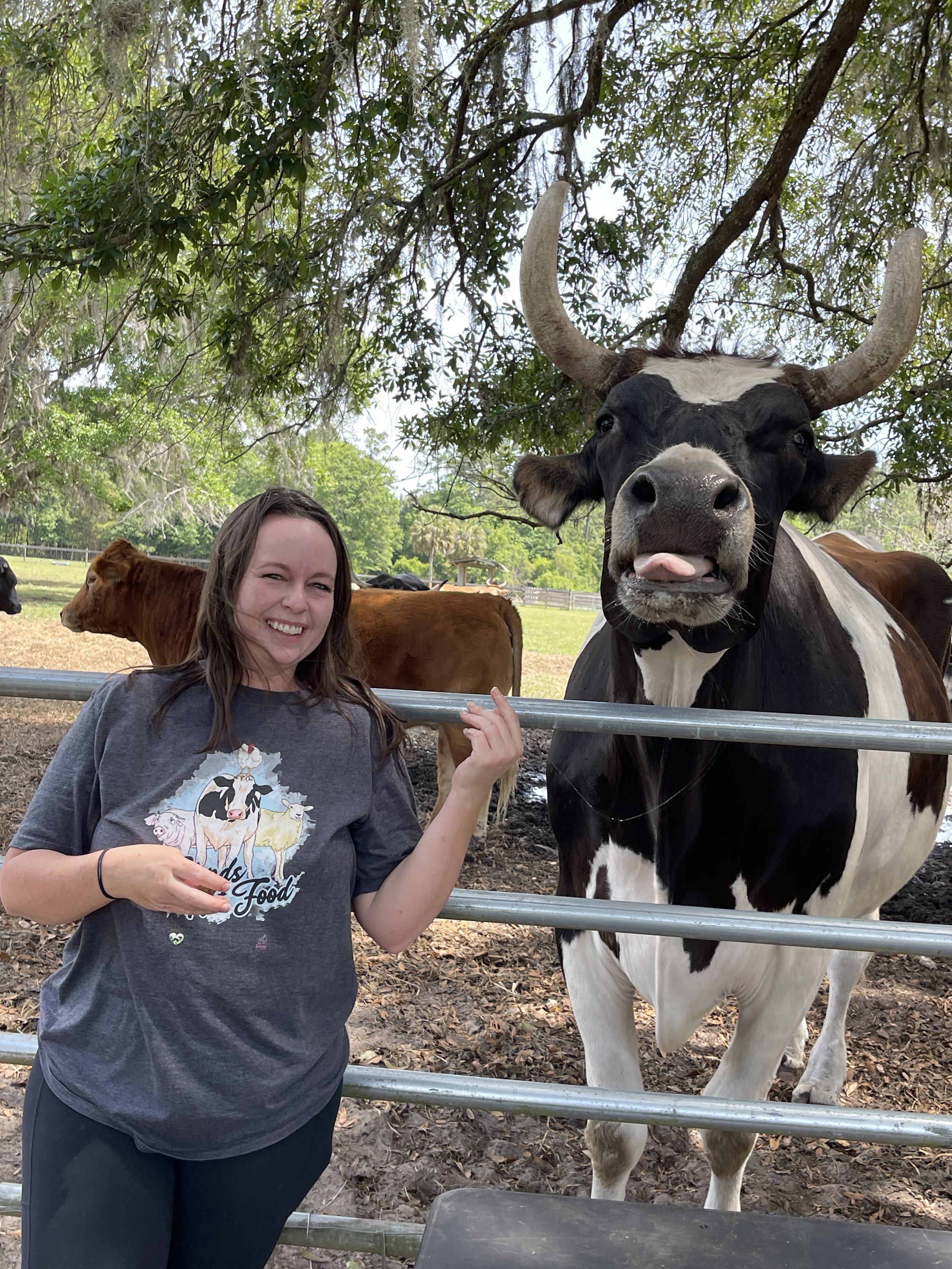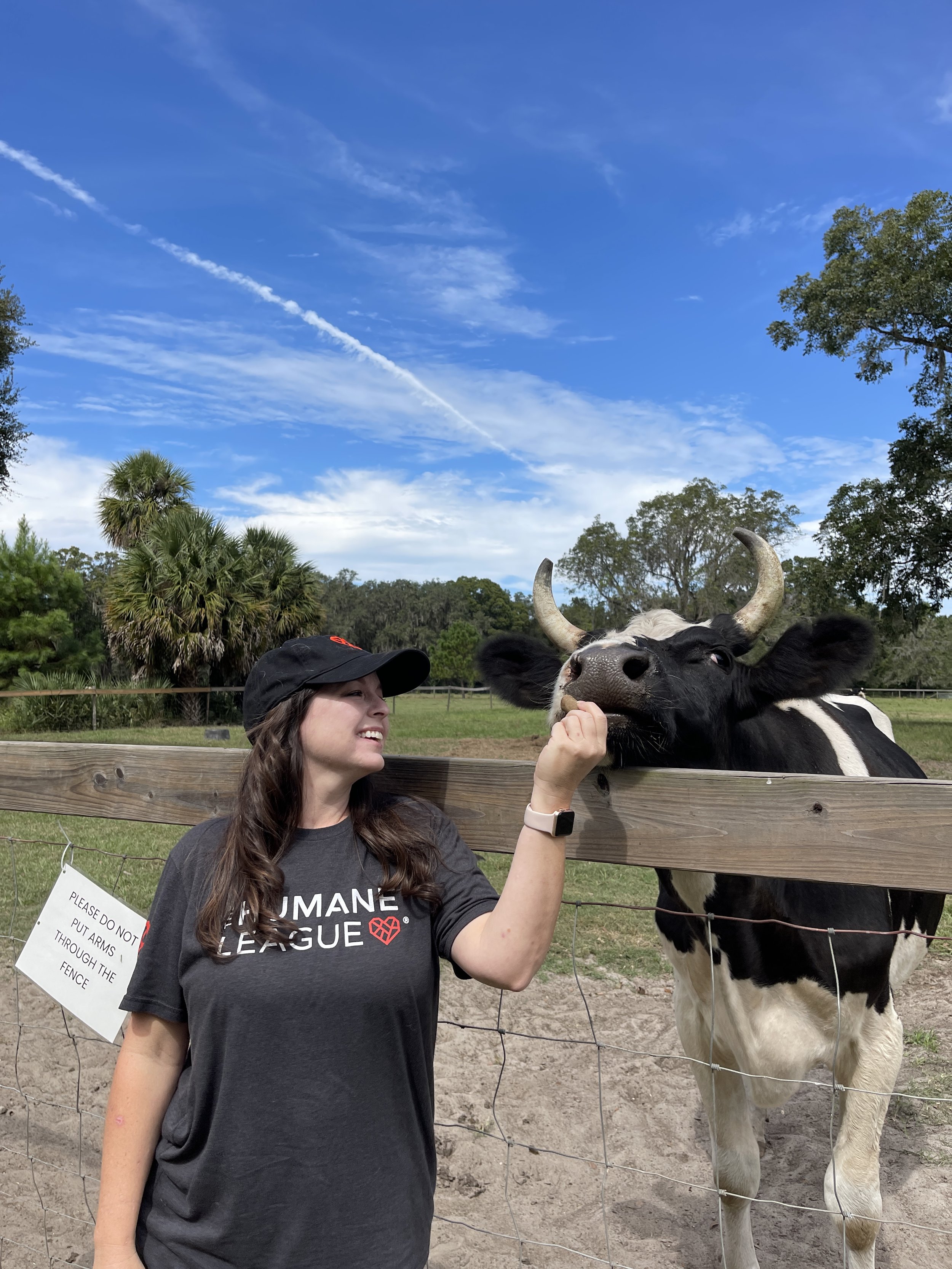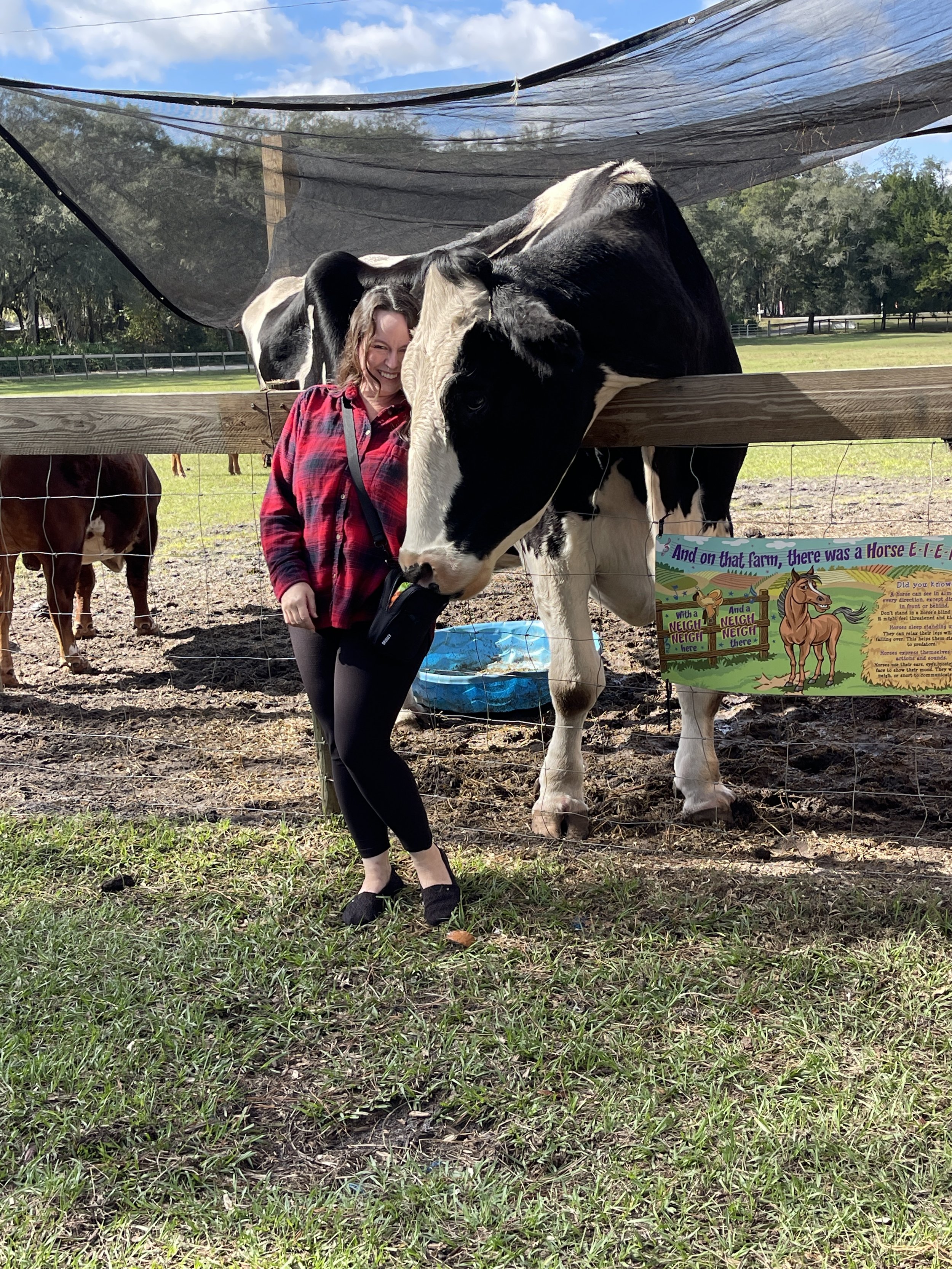I have always loved animals and known they are sentient, but it wasn’t until I watched My Octopus Teacher that I started to really think about the animal world beyond pets. Though the documentary isn't about farmed animals per se, it highlights a powerful connection between a human and an animal we often think of as food.
Prior to this, I hadn’t given much thought to where my food came from. In the moments when it did come to the surface of my mind, I assumed that farmed animals were protected by laws ensuring their wellbeing until their “final bad day”. For that reason, I only bought products labeled as organic and humane, assuming they ensured high welfare.
Following the documentary, I started researching our food system. In doing so, I discovered many interesting facts about the intelligence and emotional complexity of farmed animals. For example, cows are fantastic mothers (who also rarely have a chance to be a mother) and pigs are the fifth most intelligent animal in the world (smarter than dogs and human toddlers!).
I also learned disturbing truths about what happens to the animals trapped in this system. I was shocked to find out that despite mainstream narratives about high animal welfare, extreme suffering is the norm and is even considered a best practice in many cases. I also came to understand that factory farming is the leading cause of climate change, with devastating consequences for humans, wildlife, and our planet,.
I could write a book on all of the shocking things I learned, but thankfully I don’t need to since so many people already have. If you want to know more, please follow links I’ve shared here and on the videos and books page. You can also find many documentaries and talks on Netflix and Youtube. This page is not meant to be a comprehensive resource, but to highlight my own experience and share some key points that have played a big role in my own journey.
The Food Chain
One of the most common arguments I’ve heard for allowing these systems to continue usually comes back to some variation of the food chain — we’re either compared to lions or our caveman ancestors.
While it’s true that people have eaten animals since the beginning of time, it’s difficult for me to reconcile that historical context with our modern understanding of sentience. Culture and religion are often used to justify continuing these practices. However, we have evolved many behaviors and customs throughout human history as our technologies, intelligence, and consciousness have evolved.
It’s also important to consider that factory farming is not part of any longstanding tradition. Our farming now looks nothing like it did even 100 years ago. Farming in general is a major departure from the hunting and gathering era of human history, which was rooted in needs that no longer exist in most parts of the world.
Our current food system is primarily fueled by habit, convenience, and financial incentives, as books like Why We Love Dogs, Eat Pigs, and Wear Cows and The World Peace Diet explain in more detail.
The Entire System is Corrupt
The arguments against a plant-based diet have been thoroughly debunked time and time again. Yet, despite growing awareness of issues within our food system, we still face enormous systemic barriers.
Animal products are big business, bringing in billions of dollars annually across hundreds of thousands of companies and products. The people who stand to lose money will (and do) fight hard to ensure consumers remain confused.
Every year, millions of dollars are funneled into lobbying efforts designed to influence laws, shape media narratives, and sway public opinion, with the sole intention of increasing profits for meat, dairy, and egg producers. Numerous studies show how these lobbying efforts not only shape government policies but also actively suppress more ethical options, resulting in deeply corrupt policies and a heavily manipulated public perception.
Keep in mind that optimizing for profit (as these and all companies do) is in direct conflict with the wellbeing of the animals in these systems. The better life an animal has, the more expensive it is to care for them, and the less profit is made by the producer. This is known as a perverse incentive. Within our current economic and food system, farmed animals will always receive as little care as possible because that is what is being incentivized.
I encourage you to go to youtube and type in “slaughterhouse footage” or “factory farm footage” or “CAFO footage” so you can see what I mean when I speak of the terrible conditions they live in. Also, please understand this is the norm, not the exception. Everyone wants to believe that the animals they eat are coming from the grassy meadows with sunshine. But, this is not the reality for 99% of animal products, despite what the humane-washed labels and marketing campaigns with “happy” animals would have you believe.
"Ag-gag" laws are another layer of public manipulation, designed with the sole intention to conceal animal cruelty and penalize those who try to expose it. Think for a moment about how illogical it is that laws protect our right to break a car window to save a dog, yet rescuing ducks, chickens, pigs, or cows from similar or much worse conditions often leads to felony convictions. Anyone who has spent time around these animals knows they are no less deserving of protection.
Regardless of where anyone stands on animal rights, this level of secrecy and corruption should be concerning. Consumers deserve to know the truth and shouldn’t need extraordinary intelligence or research skills to uncover it. If the conditions in which we raise animals are too horrific to show, they should be reformed, not hidden.
A philosophy, not a diet…
I’ve chosen to focus this page primarily on the dietary aspect of veganism because it is the area where most people can have the biggest and most immediate impact. Most of us eat several times every day and, statistically, most of those meals include animal products sourced from factory farms. However, veganism is not a diet or a weird fetish with plants (although I do love plants 🌱)
"Veganism is a philosophy and way of living which seeks to exclude—as far as is possible and practicable—all forms of exploitation of, and cruelty to, animals for food, clothing or any other purpose; and by extension, promotes the development and use of animal-free alternatives for the benefit of animals, humans and the environment. In dietary terms it denotes the practice of dispensing with all products derived wholly or partly from animals."
Most people start with dietary changes but soon realize that much of our society, including many of our biggest and most profitable industries, are literally built upon the exploitation and intense suffering of animals.
Each year, more than 110 million animals are killed in U.S. laboratories for biology lessons, medical training, curiosity driven experimentation, and chemical, drug, food, and cosmetics testing. Before their deaths, many suffer agonizing, prolonged torture ranging from ingesting poisons to having their spinal cords intentionally crushed. In addition to the torment of the actual experiments, animals in laboratories are confined to barren cages, socially isolated, psychologically traumatized, and deprived of everything that is natural and important to them.
And that’s just laboratory testing. That doesn’t include the ways we cause harm through entertainment, the pet trade, “pest control”, habitat destruction, and the production of a nearly infinite list of products we buy.
Why is this happening? Put simply, financial incentives. If you’d like a more detailed history of animal usage, read Animal Liberation by Peter Singer. It will simultaneously open your heart and break it too.
“Vegan” vs“Going Vegan”
In general, I’m not a fan of -isms, as I believe there’s a risk of losing ourselves in the pursuit of an identity. I’ve seen many of the same problems in the vegan community that I’ve observed in any other ideology.
People have a lot of preconceived ideas about what veganism is or isn’t, especially what constitutes a “real vegan”. I constantly see infighting within the vegan community because there is way too much focus on the identity and not enough focus on the values. As such, I rarely use the term “veganism”.
I also reject the idea that you’re either “vegan” or “not vegan.” I believe we’re all born with values and instincts that align with vegan principles, but we suppress them as we adapt to societal norms. In my view, anyone trying to reduce harm is somewhere on the spectrum of “going vegan.”
People are complex. The systems we live in are complex. And most significant cultural changes happen in increments. Our relationship with food and animals is no exception. I believe that the puritan all or nothing approach ultimately works against animals by alienating people who might otherwise become vegan allies, vegan curious, or maybe even fully vegan.
Making others feel like the enemy, especially when they’re curious and trying to take steps forward, is not a path I will take in my advocacy. I would much rather see progress by many than perfection by a few.
My Goals
Of course I hope that my advocacy has some impact on the way people think, but my goal is not to ‘convert’ anyone.
My daughter and mom both went vegetarian long before I did and, while I was supportive of their decision, I could not have envisioned a day where I would not eat animals. No one, including them, had the ability to speed that process up. I had to arrive there on my own. And I believe most people operate in a similar way.
Therefore, I am not interested in debating with people who need to be convinced of the wrongness of our current food system. There are people out there who do that type of activism and, while I deeply appreciate the role they play in moving the animal rights movement forward, that is not my flavor of activism.
My goals are to:
Share my story so that others who may resonate with it can find comfort in knowing they are not crazy or alone
Provide factual information that I believe the general public is lacking
Ask questions that may help people think in ways that they’ve never thought before
Make the idea of going vegan feel more accessible for the average person
If you are considering going vegan
(or just want to do a little more to help animals)
It is estimated that most Americans eat approx 100-200 factory-farmed animals per year. That’s somewhere between 7,000-15,000 throughout an average lifetime. This means you still likely have thousands of opportunities to decrease the suffering of a real, sentient being.
We’re so removed from how food gets to our plate, it’s easy to be completely detached and not think about it. And I understand that temptation. It’s inconvenient and depressing. It’s so much easier to just see these living beings as inanimate objects. But if we want to change the systems, we have to allow ourselves to really confront these things, even if it’s uncomfortable.
When I started to reduce meat in my diet, I likened every meal to driving my car down the road and being given the choice to either let the chicken (or cow or pig) cross or not. I did not quit animal products “cold turkey”; sometimes I chose to not let them cross the proverbial road.
But, this mental model at least put my attention on the fact that the animals on my plate were real living creatures who not only died for me but unquestionably had a miserable life up until that point.
I recommend starting with Meatless Mondays or Veganuary or Veggan or a Reducetarian approach. Start making one meal a day meatless. Add more veggies and less meat to your plate. Try some dairy alternatives. There are so many ways you can start moving in a more plant based direction. It does not have to be all or nothing.
Some people will tell you going vegan is easy if you’re committed. I beg to differ. Even with a strong commitment, I’ve found it to be logistically challenging at times, especially in social settings, when traveling, and living in a home with multiple people who primarily eat animal products. I really wish vegans would normalize these conversations so vegan curious people don’t feel like something is wrong with them if they’re struggling.
And, as far as the food is concerned, please don’t write off vegan food just because you don’t love everything right away. One majorly underrated benefit of reducing or eliminating animals products from your diet is that your taste buds will change. For the first half of my life, I primarily ate meat, eggs, and dairy. It took me a while to adapt to the new textures, flavors, and ingredients I was cooking with, but you do adapt and learn to love these things - I promise!
New habits will also get easier and build on each other over time. I used to spend hours reading labels in the grocery store and debating over which products to buy. Over time, this has become second nature. I’ve figured out what I like, what to avoid, and how to make it work for me. The food aspect, which once felt overwhelming, has become pretty simple. And keep in mind, the more people who eat this way, the more demand it will create and the more options will become available.
I also encourage you to join some online communities. Even if you don’t need social support, you will appreciate the plethora of recipes you can find online. Instagram and Pinterest are a treasure trove. Just type in your favorite recipe and add “vegan” or “dairy free” or “plant based”. You can find anything!
A Microcosm of the Metacrisis
I’ve dedicated this whole page to discussing our food system because it is a microcosm of why we find ourselves in a metacrisis. No one can defend the ethics of factory farming — it is a total abomination in every imaginable way and most of us know this.
But it persists primarily because of momentum. There’s now so much money and convenience and narrative and habit attached to this way of doing things, it’s very difficult to tap the breaks and reimagine the entire system. Coupled with the barrage of anxiety inducing news headlines and the normal challenges of life, it’s easier to just keep things on auto pilot.
I believe that the vast majority of people are good people who genuinely care about animals, the earth, and other people, and want to do what’s right by them. But there’s so much noise that has been intentionally designed to keep us confused and mindlessly consuming, it’s difficult to know the truth and change our deeply engrained habits.
That’s why, in addition to focusing on animal-specific issues, I focus so much of my energy on broader systems issues. Just fixing the food system won’t fix the psychology that got us to this place.
The bottom line is that none of us are bystanders. We are all active participants in creating demand and shaping these systems. The supply will only stop when the demand stops, and that’s something within each of our control. Every product we buy (or don’t buy) is a vote for the kind of world we want to live in.
“We don’t need a few people doing veganism perfectly. We need billions of people doing veganism imperfectly.”
- Brandi Dupre
For not-yet-vegans:
For vegans:
Vegan Info
Vegan Society - provides information on all aspects of vegan living
Vegan.com - the Internet’s most comprehensive and accurate source of vegan information on every topic
Veg News - an award-winning vegan magazine and website packed with recipes, travel, news, food, reviews, and so much more
HumaneMyth.org - a community of former farmers, animal rescuers, animal sanctuary founders, educators, and artists working to create a just and nonviolent future
Carnism Debunked: common myths and arguments
Cruelty-Free Shopping
abillion - consumer-to-consumer marketplace for all things vegan
Happy Cow - the world's largest vegan community and food map
Peta Cruelty-Free (Product Database) - searchable database of companies that do and that don’t test their products on animals
Cruelty-Free Kitty (Product Database) - the leading voice in cruelty-free beauty with rigorous research into the policies of brands and their involvement in China, as well as the ever-changing landscape of animal testing laws and regulations












